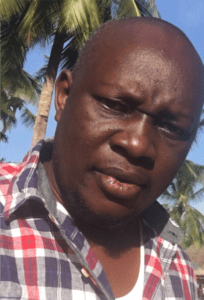 Our November Immunologist of the Month is Collins Ouma, Professor in Biomedical Sciences at the Department of Biomedical Sciences and Technology, Maseno University, Kenya. Collins obtained his PhD in immunogenetics at Kenyatta University in 2007. He worked for several years at the Kenya Medical Research Institute (KEMRI) as a Research Scientist in the CDC/KEMRI Laboratories before joining the University of New Mexico/KEMRI Laboratories (currently based at Maseno University) as a PhD and then postdoctoral fellow in immunogenetics. At Maseno University, Collins has led the Department of Biomedical Sciences and Technology, was a Dean of the School of Public Health and Community Development and later was the Director of Research, Publications and Innovations. He has also transitioned through several positions including being the Program Leader for Health Challenges and Systems, African Population and Health Research Center (APHRC) and Director, Research and Knowledge Translation at the African Institute for Development Policy (AFIDEP). He has also led several research teams in both immunology and genetics on infectious and non-communicable diseases.
Our November Immunologist of the Month is Collins Ouma, Professor in Biomedical Sciences at the Department of Biomedical Sciences and Technology, Maseno University, Kenya. Collins obtained his PhD in immunogenetics at Kenyatta University in 2007. He worked for several years at the Kenya Medical Research Institute (KEMRI) as a Research Scientist in the CDC/KEMRI Laboratories before joining the University of New Mexico/KEMRI Laboratories (currently based at Maseno University) as a PhD and then postdoctoral fellow in immunogenetics. At Maseno University, Collins has led the Department of Biomedical Sciences and Technology, was a Dean of the School of Public Health and Community Development and later was the Director of Research, Publications and Innovations. He has also transitioned through several positions including being the Program Leader for Health Challenges and Systems, African Population and Health Research Center (APHRC) and Director, Research and Knowledge Translation at the African Institute for Development Policy (AFIDEP). He has also led several research teams in both immunology and genetics on infectious and non-communicable diseases.
What is your research interest and field? My focus is on immunogenetic basis of infectious and non-communicable diseases. This approach provides us with the opportunity to understand the genetic basis of the immune responses in human host population whenever they have or do not have disease over time. We have been able to study immunogenetics of severe malarial anaemia in paediatric populations in western Kenya over several decades. In addition, we have recently extended our studies into HIV, TB, HIV-TB co-infections, endemic Burkitt Lymphoma and other cancers e.g. cervical cancer.
What recent discoveries from your research group would you highlight and how has it impacted the field of immunology ? To date, we have profiled over 500,000 genes that could potentially be important candidate genes in the design of an effective malaria vaccine in populations from western Kenya. We are using the same arguments in studies of non-communicable diseases in the western Kenyan population.
Why did you choose the immunology specialty ? I first encountered immunology in my undergraduate courses and the 3 lecturers that taught me the three main courses at that time were awesome and gave the best course I had ever interacted with. The desire to get deeper into it pushed me into a Master program and later PhD, in which I realised that there were lots of inter-connections between individual responses and their genetic make-ups.
In your opinion, are there less or more open questions now? I think with the unravelling of the human genome, more questions have arisen with a heightened need to carry out more research relating to the immunogenetics of infectious and non-infectious diseases. Some of the most interesting research has been on understanding how disruptions in signalling pathways and transcription factors contribute to disease, the use of genetics and genomic approaches to identify and better understand pathways involved in human genetic diseases and normal development. Model systems, including genetically altered mice and in vitro cell and organ culture systems are major components driven by these knowledge. We still believe that these will form a strong basis aimed at understanding genetic contributions to a number of human diseases.
What would be your advice or recommendations for students that are finishing their PhD?PhD is not for the faint-hearted and you have made it. Now use the knowledge you have acquired and generated to change the world, if not immunologically, through other means—but it has to count now and forever!
Contact Details: collinouma@yahoo.com; couma@maseno.ac.ke
Interview by Stanslaus Musyoki










